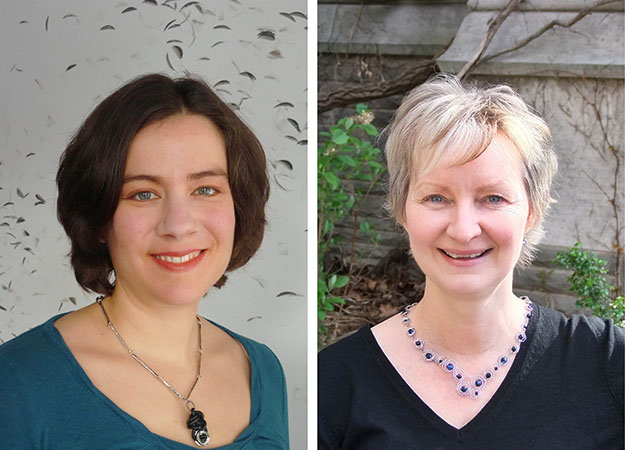Punchin’ in, punchin’ out at the Music and Labour conference

Associate professor Christina Baade (left), professor Susan Fast and dozens of pop music researchers will be sharing ideas with the local music community this weekend at the four-day Music and Labour conference in downtown Hamilton.
How do you plan for retirement when your next gig isn’t booked yet? Christina Baade knows the answer will have a big impact on Canada’s economic future.
This coming weekend, nearly 100 pop music scholars and researchers will converge in downtown Hamilton to swap papers, view documentary films and attend workshops at the McMaster-led Music and Labour conference.
For Baade — associate professor of popular music, and co-organizer of the event along with professor Susan Fast — the weekend conference offers a rare and unique opportunity to discuss the music industry as exactly that: an industry.
“In our culture, we like to talk about passion and love on one side, and money, selling-out and commercialism on the other,” says Baade, herself a former clarinetist with the Wisconsin-based klezmer group Yid Vicious. “This way of speaking about music is good for how we like to imagine or romanticize things. But that approach also can be very bad, when it comes to a musician actually making a living or being able to say, ‘I don’t just want to make music for fun.’”
Many talks at the Music and Labour conference will revolve around two major themes — technological changes in music production and consumption, and how economic uncertainty in recent years has impacted the music industry. One of the key points, she explains, is to view music in the same way we’d discuss manufacturing, healthcare, tourism and other sectors of local and national economies.
One of the issues in doing so is trying to conceptualize things such as taxes, home ownership and retirement for someone in an industry with no guaranteed, long-term income. Another is the “burn out” factor that can simply grind a performer down after years on the road, and figuring out how that person can reenter the workforce in a new way. Popular opinion of the Canadian music industry isn’t helping, either.
“I think there’s a perception that people are making more money at it than they actually are,” says Baade. “When we see someone who is having a ‘successful’ career, what we’re not seeing is the enormous amount of hours they’re putting into it. We’re not seeing the day jobs, and we’re not seeing the partners and families who are doing things to support that person.”
So how do we help those in the industry today? Public funding isn’t an easy sell, says Baade, but reinforcing the intrinsic social value of music may do wonders. In other words, driving home the fact that musicians and their colleagues come equipped with tangible, valuable and marketable skills — many of which may be transferable to other sectors. For example: having the ability to connect with other people, develop a brand and share a message. Pursuing new educational opportunities is also an option.
“We actually have some students in our MA program in Communication and New Media who had very successful careers in music, but they’re getting a little closer to their 30s,” she explains. “I think some people are looking to move into music education, arts education or community organizing types of roles.”
On Friday, May 24, an afternoon panel featuring some of the most notable figures in the local music community will address urban arts-revitalization in the Hamilton area.
Mark Milne, co-owner of Sonic Unyon; Hamilton Spectator music critic Graham Rockingham; and Jamie “Gunner” Smith, a former tour manager and popular radio personality at McMaster’s own 93.3 CFMU, are all on board for the discussion. With more than 20 years in the music business, Smith has witnessed first-hand how the city’s economic focus has shifted.
“Hamilton has always been an industry town. You put the factory in, build the houses up around it and people go to work,” he says. “But music isn’t like that. It’s a 24-hour industry, and it’s all about the art of self-promotion.”
While the James Street North arts scene is alive and thriving, Smith wants to see more long-term planning and community input when it comes to promoting the “industry” side of Hamilton’s music community. Much like Baade, he says it all comes down to reimagining music as a viable, sustainable economic driver — one that can help elevate the city to new heights.
“Art and music can really work to change your living environment in a city,” says Smith. “You start an event like the art Supercrawl on James Street, it catches on and then others start organizing similar events. It really is a living, breathing thing.”
Other events at the Music and Labour conference include a “mini” art crawl with a focus on the James Street North scene; workshops with McMaster’s student-led Cybernetic Orchestra; a panel celebrating 30 years of the International Association for the Study of Popular Music’s Canadian branch (collaborators in the event); and a party at Homegrown Hamilton on Saturday night, featuring DJ Devon Craig and local hip-hop collective Canadian Winter.
The Music and Labour conference will take place May 23-26 at various locations in downtown Hamilton. All inquiries can be directed to Christina Baade at baadec@mcmaster.ca.

